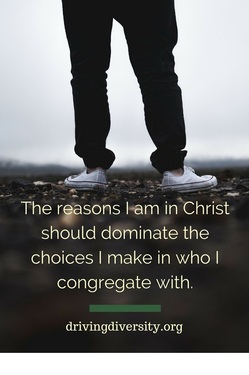 Attend and congregate—here are two simple verbs that are often used to describe what the church is or what one does in relation to church. Is the church a place we go to or something we are a part of? Do you go to (attend) church or does your church gather (congregate) regularly at a particular place and time? Now before you dismiss this post as splitting of hairs, stick with me a minute or two. I think the difference is more than semantics. The difference between the church as people or place is crucial. If the church is a place that one attends, then how we get people to come to it becomes a real question. It deals with marketing and consumption. We want to give our attendees a great experience, a good product, so that they will become faithful customers/attenders. Is this not what we are all about in the church these days--attracting customers? Loyal customers who stay with us year after year. Even more so, we want customers who will become salespeople, like your classic pyramid scheme. This is just one of the many pitfalls of redefining church as a place we attend. Now, if the church is a congregation that we are a part of, then it would make sense that we should gather periodically. We need to gather to refresh our relationships with one another. Just like families gather; we gather not to become family, but to stay current, to stay in touch and enjoy each other’s company. But the church is more than a family. We are the body of Christ. This means we share in his vision and mission. So we also need to gather to discuss how to work together in that mission and to celebrate the reason we are one in the first place. This is often called worship. We gather to sing, shout, rejoice, and learn so that we can represent him better and better within our spheres of influence. So what does this have to do with diversity? Well, if church is something we attend, then it really doesn’t matter where we attend. We can pick the consumer experience that best caters to our own personal likes and needs. This view of the church results in a segregated church. If on the other hand, the church is something supernatural that we belong to by the Holy Spirit’s presence in our lives, then I don’t get to choose who I congregate with. The reasons "I am in Chris"t should dominate the choices I make in who I congregate with- namely, to represent him well in the world as his body extended to each other and our community. This view of the church drives us towards diversity. 8/22/2019 01:37:47 am
You're correct, attending church is something we choose whether we do it or not. It is never a requirement, yet we still do. Although, I also agree that attending church does not automatically mean that you are genuinely focused on the meaning of actually attending a mass. I know a lot of people who join mass for a show, some are forced and some are doing it for the sake of being called a good person. I believe that even if we do not go to the church, as long as your faith in god is purely there, then there's nothing to worry about.
XA Diversity
11/22/2022 11:31:39 am
People definitely have different reasons for attending church services, yet Scripture clearly defines the purpose and benefit of regularly gathering with 'Christ's body' and 'one's community.' One can experience God outside of the four walls of church. Yet, we are able to more profoundly experience the LORD when in consistent relationship with His body. This is where confession, repentance, forgiveness, discipleship, and intercession are able to happen.
Darren Card
7/31/2020 05:32:52 pm
Church is a verb in itself. To church is to congregate on issues of religion or state (there once was no separation of religion or state). In recent history the later is all but been wiped of public definition, in order to take away ones rights to church. By redefining the word as a noun, or simply religion or building, the right “to church” is limited to the an ability to go to church; which is not a right.
XA Diversity
11/22/2022 11:44:54 am
Even since the birth of the first century church, followers of Christ have been persecuted. Scripture encourages us that if we are hated by the world, it is because it first hated Him. This is empowering because we are promised that as His children in a sin stained world, we will not only suffer as Christ did, but live as more than conquerors and be resurrected in His glory with Him.
XA Diversity
11/22/2022 11:48:56 am
Thanks so much for reading! Share with a friend. I like that you talked about gathering together in a church service will also refresh the relationship we have with our brethren. I guess I should attend one even if I moved into a new location on my own. It will even help me have new friends in the area here in Brentwood, California, since I have no relatives nor friends living here.
XA Diversity
11/22/2022 11:51:26 am
Totally. Life alone is much less fulfilling. It is a blessing from God to share community with other believers. This is where mutual encouragement and accountability come from! It can be scary and difficult finding a place to 'fit in,' but it is worth taking the time to seek out a Christ-centered community. It will bless you. Comments are closed.
|
Categories
All
Contributing Authors
|

 RSS Feed
RSS Feed